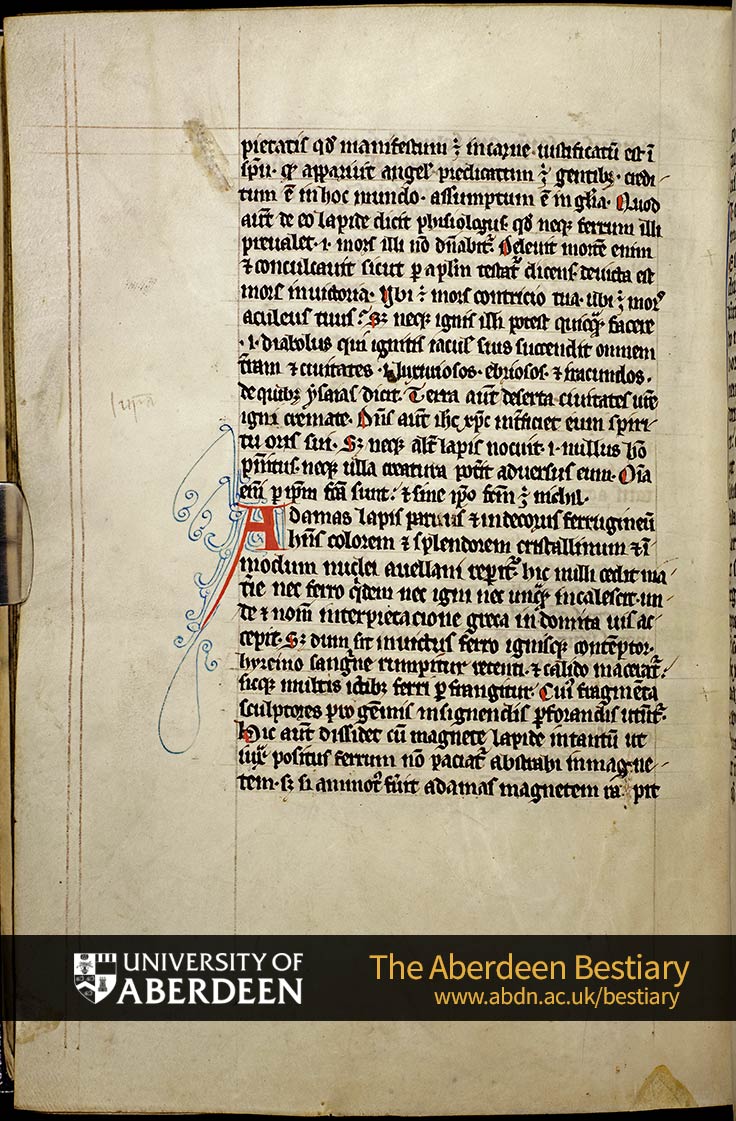Folio 95v - the adamas stone, continued.
godliness; God was manifest in the flesh, justified in the Spirit, seen of angels, preached unto the Gentiles, believed on in the world, received up into glory' (1 Timothy, 3:16).
Moreover, Physiologus says of the adamant stone that iron does has no effect on it, just as, death will not rule Christ. For he destroyed death and trampled on it, as the apostle bore witness, saying: 'Death is swallowed up in victory. O death, where is thy sting?' (1 Corinthians, 16:54-55).
Nor is this stone affected by fire, meaning the devil who with his blazing darts burns the whole earth, its cities and its wanton, drunken and raging inhabitants; of these Isaiah says: 'Your country is desolate, your cities are burned with fire' (Isaiah, 1:7). 'The Lord Jesus Christ shall consume him with the breath from his mouth' (see 2 Thessalonians, 2:8).
No other stone can damage adamant, that is, no man at all, nor any creature, can oppose Christ. 'All things were made by him, and without him was not any thing made' (John, 1:3).
Adamant is a small and unsightly stone, with a dusky colour and the brightness of crystal, and is about the size of an Abelline nut. It yields to no other matter, not iron, nor indeed fire, and it never grows hot; for this reason its name, translated from Greek, means 'invincible force'.
While adamant remains unconquered by iron, however, and scorns fire, it can broken by the fresh blood of a goat, softened by heat and thus crushed with repeated blows of iron. Engravers use fragments of it for engraving and cutting gemstones.
Adamant is at odds with the magnet stone in so much as, placed near iron, it will not suffer the metal to be drawn to the magnet; if the adamant is removed, however, the magnet seizes
- Commentary
-
Commentary
Text
The great strength of the adamas stone and how it can be used.
Comment
Initial, type 4.
Folio Attributes
- Transcription and Translation
-
Transcription
pietatis quod manifestum est in carne iustificatum est in\ spiritu, quod apparuit angelus predicatum est gentibus, credi\tum est in hoc mundo, assumptum est in gloria. Quod\ autem de eo lapide dicit Phisiologus, quod neque ferrum illi\ prevalet, id est mors illi non dominabitur. Delevit mortem enim\ et conculcavit sicut per apostolum testatur dicens: Devicta est\ mors in victoria. Ubi est mors contricio tua, ubi est mors\ aculeus tuus? Sed neque ignis illi potest quicque facere\ id est diabolus qui ignitis iaculis suis succendit omnem\ terram et civitates, luxuriosos, ebriosos, et iracundos,\ de quibus Ysaias dicit: Terra autem deserta civitates vestre\ igni cremate. Dominus autem Jesus Christus interficiet eum spiri\tu oris sui. Sed neque alter lapis nocuit, id est nullus homo\ penitus neque ulla creatura poterit adversus eum. Omnia\ enim per ipsum facta sunt, et sine ipso factum est nichil. \ Adamas lapis parvus et indecorus ferrugineum\ habens colorem et splendorem crista\llinum et in\ modum nuclei avellani. Hic nulli cedit ma\terie nec ferro quidem nec igni nec unquam incalescit, un\de et nomen interpretacione Greca indomita vis ac\cepit. Sed dum sit invictus ferro ignisque contemptor,\ hyrcino sanguine rumpitur recenti, et calido maceratus,\ sicque multis ictibus ferri perfrangitur. Cuius fragmenta\ sculptores pro gemmis insignendis perforandis utuntur.\ Hic autem dissidet cum magnete lapide in tantum ut\ iuxta positus ferrum non paciatur abstrahi in magne\tem, sed si ammotus fuerit adamas magnetem [magnes] rapit\Translation
godliness; God was manifest in the flesh, justified in the Spirit, seen of angels, preached unto the Gentiles, believed on in the world, received up into glory' (1 Timothy, 3:16). Moreover, Physiologus says of the adamant stone that iron does has no effect on it, just as, death will not rule Christ. For he destroyed death and trampled on it, as the apostle bore witness, saying: 'Death is swallowed up in victory. O death, where is thy sting?' (1 Corinthians, 16:54-55). Nor is this stone affected by fire, meaning the devil who with his blazing darts burns the whole earth, its cities and its wanton, drunken and raging inhabitants; of these Isaiah says: 'Your country is desolate, your cities are burned with fire' (Isaiah, 1:7). 'The Lord Jesus Christ shall consume him with the breath from his mouth' (see 2 Thessalonians, 2:8). No other stone can damage adamant, that is, no man at all, nor any creature, can oppose Christ. 'All things were made by him, and without him was not any thing made' (John, 1:3). Adamant is a small and unsightly stone, with a dusky colour and the brightness of crystal, and is about the size of an Abelline nut. It yields to no other matter, not iron, nor indeed fire, and it never grows hot; for this reason its name, translated from Greek, means 'invincible force'. While adamant remains unconquered by iron, however, and scorns fire, it can broken by the fresh blood of a goat, softened by heat and thus crushed with repeated blows of iron. Engravers use fragments of it for engraving and cutting gemstones. Adamant is at odds with the magnet stone in so much as, placed near iron, it will not suffer the metal to be drawn to the magnet; if the adamant is removed, however, the magnet seizes

